How to fertilize raspberries – for a bumper crop year-after-year
Essential tips to add to your annual raspberry maintenance routine
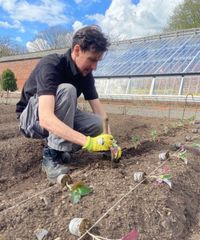
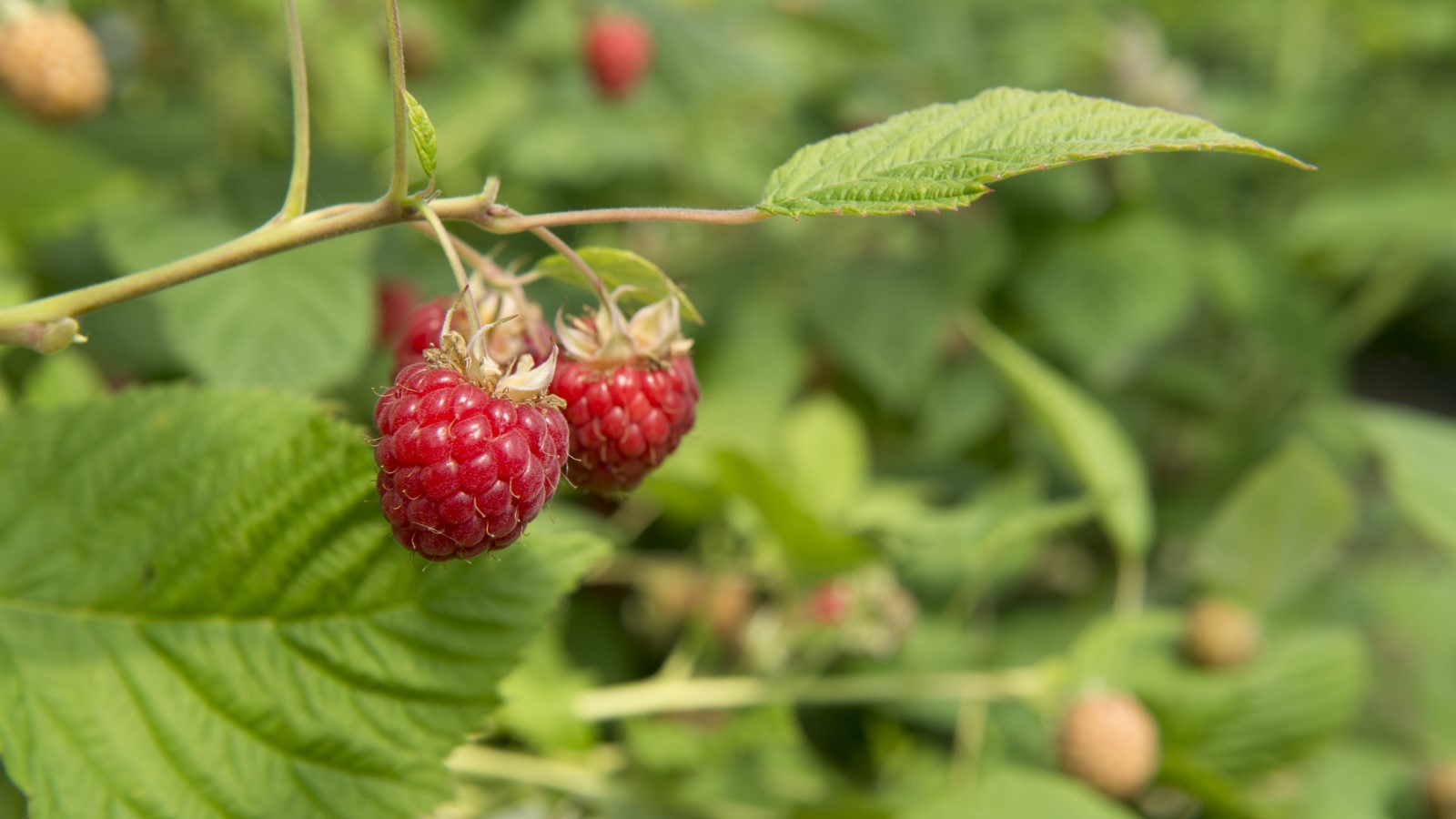
Design expertise in your inbox – from inspiring decorating ideas and beautiful celebrity homes to practical gardening advice and shopping round-ups.
You are now subscribed
Your newsletter sign-up was successful
Want to add more newsletters?

Twice a week
Homes&Gardens
The ultimate interior design resource from the world's leading experts - discover inspiring decorating ideas, color scheming know-how, garden inspiration and shopping expertise.

Once a week
In The Loop from Next In Design
Members of the Next in Design Circle will receive In the Loop, our weekly email filled with trade news, names to know and spotlight moments. Together we’re building a brighter design future.

Twice a week
Cucina
Whether you’re passionate about hosting exquisite dinners, experimenting with culinary trends, or perfecting your kitchen's design with timeless elegance and innovative functionality, this newsletter is here to inspire
Raspberries are prolific fruits to grow at home and need regular fertilization to guarantee a great harvest. Choosing the best type of feed is key to getting a bumper crop.
An important part of growing raspberries is to feed them with a balanced fertilizer that will provide all the essential nutrients required to grow the canes and produce fruit.
There are options available for both organic and synthetic fertilizers to feed these hungry plants, whether you are growing raspberries in the ground or in pots. Keep your raspberries well-fed and they will reward you with a great crop of fruit year after year.
How to fertilize raspberries
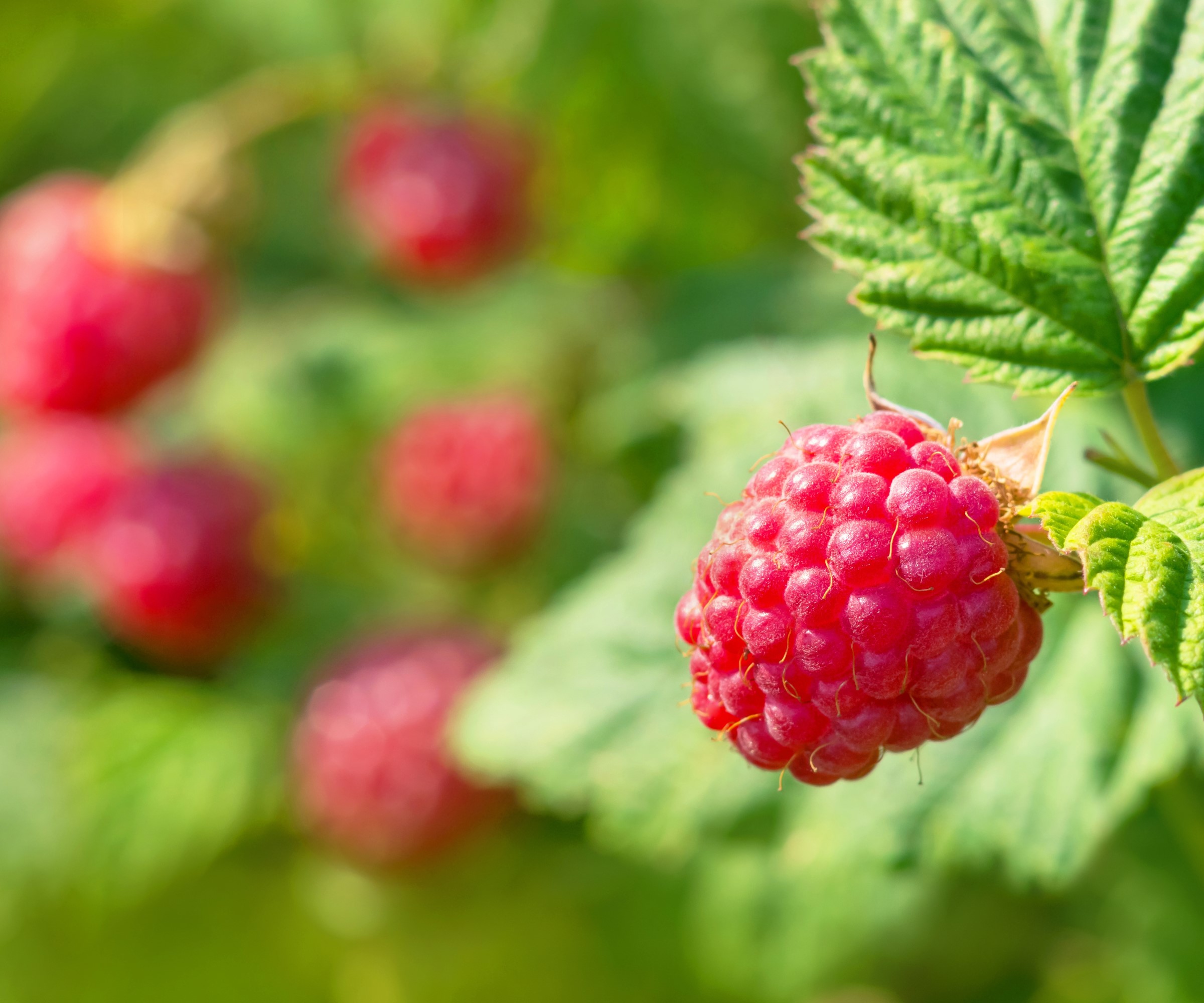
Raspberries benefit from an annual feed to produce a bounty of fruits
Raspberry plants are hungry feeders and benefit from fertilizer for their strong growth and heavy cropping in late winter or early spring. Every year the plant uses up lots of nutrients producing their canes and fruit. So, established raspberry canes need an annual feed that occurs before the new growth begins.
If you are growing raspberries in pots, then they require a bit more of an intensive schedule of feeding. Add a slow-release fertilizer when planting the canes in the pots and then feed them every two weeks with a high potash fertilizer from April to September.
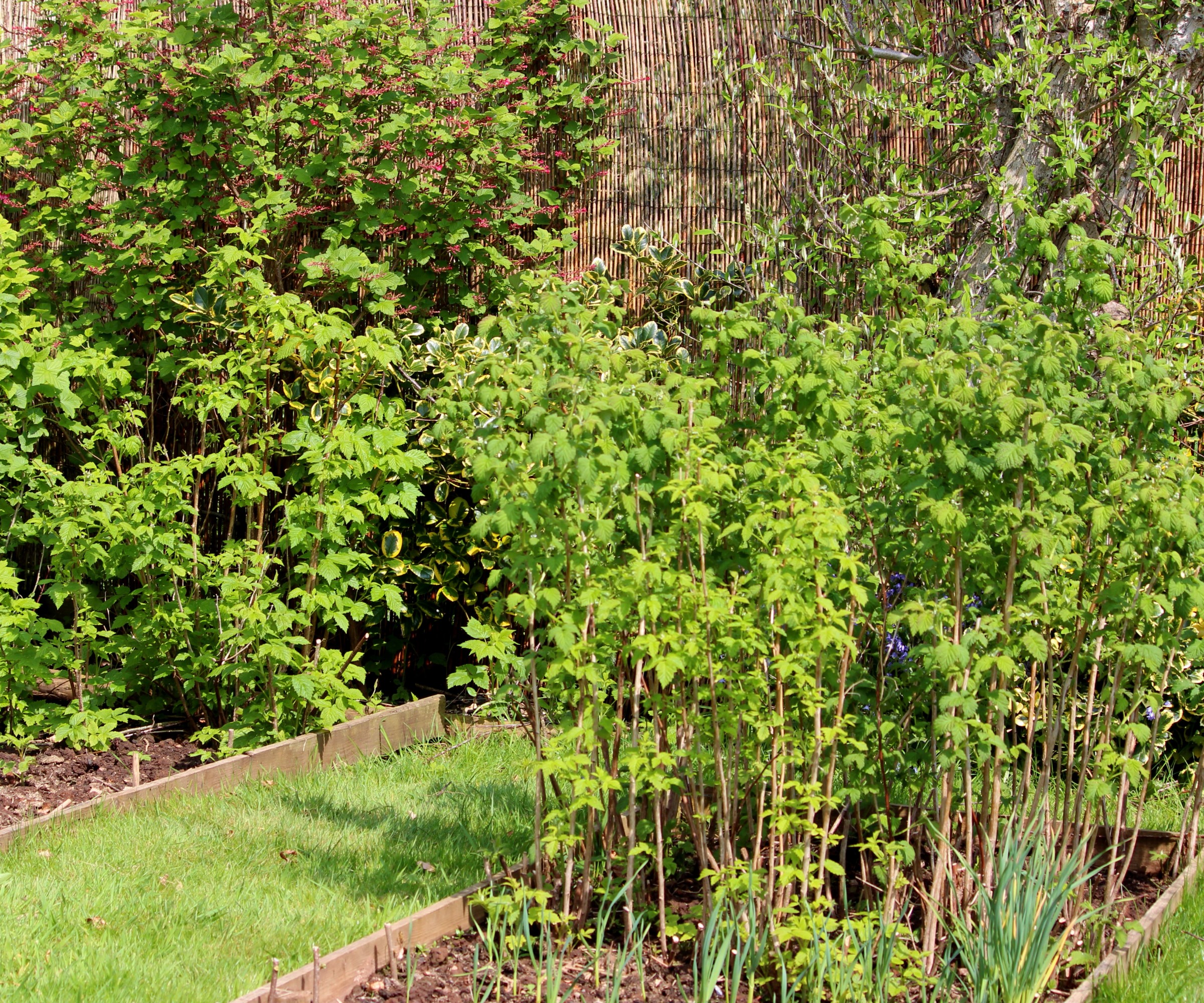
Raspberry canes can get an additional summer feed just as berries start to ripen
When planting raspberry canes, it is recommended to enrich the soil prior with homemade compost or well-rotted manure. The addition of a balanced slow-release fertilizer at the time of planting raspberries will also give extra nutrients to support the plants as they grow.
Compost or well-rotted manure are fantastic, and organic, options for feeding raspberries. They can be added both at the time of planting, or when you transplant raspberries, and also as an annual mulch in spring to help smother weeds and enrich the soil. Always ensure that any manure used is well-rotted, as fresh manure can burn roots and potentially kill plants.
Design expertise in your inbox – from inspiring decorating ideas and beautiful celebrity homes to practical gardening advice and shopping round-ups.
In the spring, established raspberries should also be fertilized with a balanced fertilizer. A balanced feed contains an equal amount of the three important nutrients, nitrogen, phosphorus and potassium – referred to as NPK. A balanced feed will have these three plant fertilizer numbers showing as the same, such as 10-10-10 or 20-20-20.
Fertilizer for raspberries can either come in granular or liquid form and should only ever be applied at the recommended rate – exceeding that can cause serious problems for the plants.
Granular fertilizers are the most common feed for raspberries and should be sprinkled around the canes or added via side dressing, where it is applied in a shallow trench along the side of the crops to be covered with soil and watered in. Make sure that any fertilizer does not touch the canes, as such contact can burn the plant. Less-common liquid feeds are water-soluble and mixed with water and applied directly to the base of the plants.
There are a range of other fertilizers that are suitable for raspberries. As well as the aforementioned compost, you can make a homemade natural comfrey fertilizer that would be mixed with water and applied to the crop. You can get organic and natural slow-release granular fertilizers, such as the Earth-Care Plus All Purpose Natural Organic Fertilizer available at Walmart, while the likes of bone meal, blood meal, fish emulsion, or chicken manure pellets are also ideal solutions.
Raspberries do prefer a slightly acidic soil, with a pH of around 6.5-6.7, and that can impact the choice of fertilizer, especially when growing the canes in pots. John Negus, a gardening expert for Homes & Gardens, suggests to ‘feed them monthly with a granular ericaceous fertilizer from April to September’ if you want to lower the soil pH in the pot.
Fertilizers that can help to make soil more acidic include sulfate of potash or even coffee grounds. Both options should be well worked into the soil and will slowly lower the soil pH over time. An example of one potential feed is the Down to Earth All Natural Acid Mix Fertilizer available at Amazon.

John has been a garden journalist for over 50 years and regularly answers readers' questions in Amateur Gardening magazine. He has also written four books and has delivered many talks over the years on horticulture.
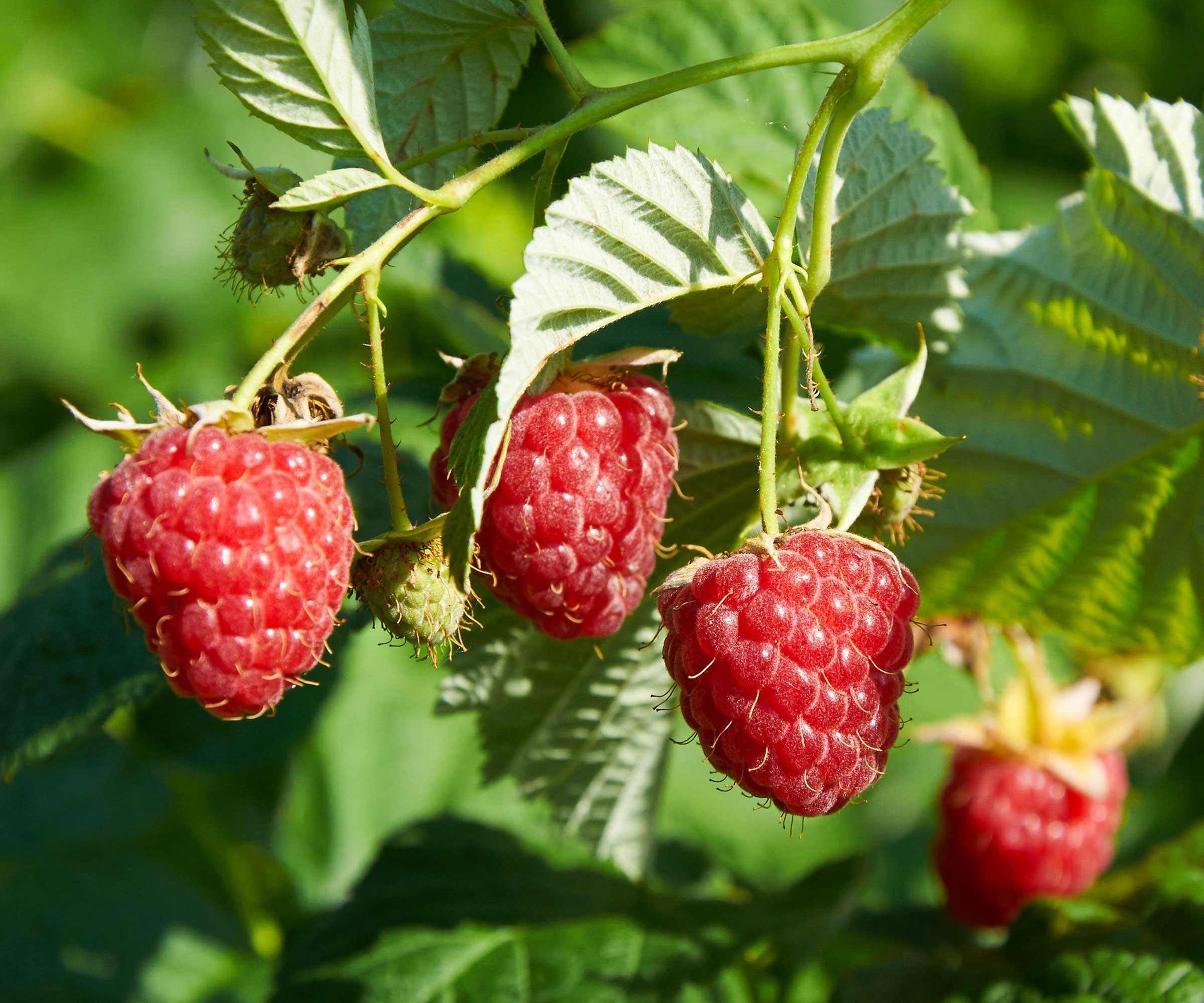
Fertilizers will provide all the nutrients required for a great harvest
FAQs
Do raspberries like bone meal?
Bone meal is a good option to use when fertilizing raspberries every spring. It is a product made from animal bones that is ground into a powder. It is an organic fertilizer and a good source of nitrogen and phosphorus, the latter of which promotes root and flower production. Bone meal is a slow-release fertilizer so only needs one application per season. To apply bone meal, mix it well into the soil and water well afterward. An alternative is to get Jobe's Bone Meal Fertilizer Spikes available at Amazon that are pushed directly into the soil.
Can I use tomato feed on raspberries?
Tomato feed can be useful for raspberries as its high levels of potassium will encourage the canes to flower and fruit. Any feed designed for use when growing tomatoes is particularly beneficial when growing raspberries in pots. An example is the Miracle-Gro Water Soluble Tomato Plant Food available at Walmart.
Raspberries are hugely popular fruits as they are simple crops to grow and, as well as the berries being delicious, they are enjoyable to pick. If you have raspberries in your kitchen garden or backyard, then it is vitally important to fertilize these hungry plants to keep them producing. It can be done as little as once a year – a quick and simple task that can make all the difference come harvest time.

Drew has worked as a writer since 2008 and was also a professional gardener for many years. As a trained horticulturist, he worked in prestigious historic gardens, including Hanbury Hall and the world-famous Hidcote Manor Garden. He also spent time as a specialist kitchen gardener at Soho Farmhouse and Netherby Hall, where he grew vegetables, fruit, herbs, and cut flowers for restaurants. Drew has written for numerous print and online publications and is an allotment holder and garden blogger. He is shortlisted for the Digital Gardening Writer of the Year at the 2025 Garden Media Guild Awards.